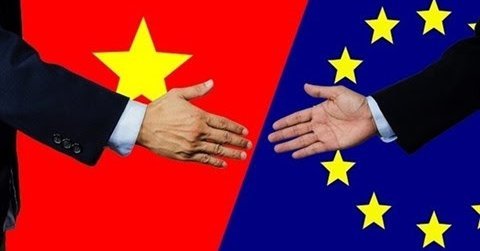Free trade: a virtuous ideal for human rights
While the virtues of free trade are debatable, the European Union seems determined to try to make it into a lever for the development of human rights, according to the Commission’s document entitled ‘Trade for All’. This rests on a policy of mutual benefit: the EU opens its markets in return for respect for international trading regulations and fundamental liberties.
Since 2012, relations between the EU and Vietnam have been defined by a Framework Agreement on Partnership and Cooperation. The new free-trade agreement will now support this cooperation. As it is legally bound to the Agreement on Partnership and Cooperation, the new agreement will allow free trade to serve as a mechanism to push for the development and respect of human rights. The Agreement on Partnership and Cooperation contains what are often called ‘human rights clauses’. The idea is simple: all violations of human rights would allow “appropriate measures” to be taken, according to the exact terms of the texts. In other words, the free trade agreement allows economic sanctions to be imposed if Vietnam commits human rights violations. The European institutions seem optimistic about the anticipated benefits. Geert Bourgeois, Member of the European Parliament and rapporteur, estimates that “the ratification [of this agreement] will further reinforce progress in labour and environmental standards, as well as in human rights.” This seems to suggest a capacity to exert a certain economic pressure on their partner.
To do this, the EU will reinforce its position as one of Vietnam’s main trading partners (17% of Vietnamese exports go to EU markets) and support the country’s development. The EU is particularly encouraging opening up key sectors to investment, such as food, drink, ceramics, and construction, which are recruiting a large proportion of the Vietnamese population. Thus economic growth in Vietnam would be driven by Europe, at least in these sectors. By establishing a form of guidance or dependence, the EU hopes to acquire sufficient influence to persuade Vietnam to respect human rights. Without which, the imposition of economic sanctions would have a definite impact on the Vietnamese economy.
Thanks to this support, the EU has obtained a commitment from Vietnam to apply the conventions of the International Labour Organisation (ILO) and to ratify the Paris Agreement. Therefore the strategy seems to be paying off. However, while all of this may justify the EU institutions’ enthusiasm, it must not obscure the fact that the partnership will undoubtedly need a more coercive form of support, as it is already struggling.
A good talking-to… for nothing?
For several years now, respect for democratic principles and human rights has been central to relations between the European Union and Vietnam. To this end, they have established an annual dialogue. Except the reports from these annual meetings lead us to believe that cooperation between the two parties has been only moderately effective.
In 2017, the European Union highlighted a breakdown of Vietnamese citizens’ civil and political rights and invited its partner to step up its efforts. In 2018, the EU condemned punishments for activists defending the promotion and protection of human rights. In 2019, this criticism was reiterated following Vietnam’s punishment of Nguyen Ngoc Anh, an activist who used his freedom of expression online to defend his views.
There are also the latest reports from NGOs on the situation in Vietnam. In its most recent reports, Amnesty International lamented flagrant violations of human rights: repression of freedom of expression, particularly following the adoption of new legislation on online expression; arbitrary arrests; disappearances, torture, and deaths in custody.
Despite these clear violations, the European Union has not imposed any sanctions on Vietnam. Yet this would have been possible through the Agreement on Partnership and Cooperation. Still, this should not come as a surprise. While several agreements made by the European Union allow sanctions to be imposed for violation of human rights, such sanctions have almost never been imposed. There is one exception: the Partnership and Co-operation Agreement with Uzbekistan. Following lethal government repression during a protest, the European Union partially suspended the agreement in 2005. To this day, this is the only example of a sanction being imposed on the basis of human rights violation.
In order to make up for its earlier failures, the European Union seems to have found a way to watch out for and push for the respect and development of human rights. It is pinning its hopes on the fact that “this agreement is a lever to improve the situation,” according to Geert Bourgeois, who also said that the EU will monitor Vietnam’s compliance with its commitments.
Compared to the record of failures of diplomacy and cooperation, free trade could prove to be a credible alternative. While the institutions are all showing a certain optimism for the agreement’s benefits for human rights, they must now take action to make this optimism a reality. The situation of fundamental liberties in Vietnam requires that the EU must at last leave its passivity behind, take hold of the mechanisms at its disposal and push with all its might for these liberties to be respected.
The pressure is all the more intense because this agreement is intended to serve as a model for future agreements with other developing countries. The European Union has embarked on a balancing act in which it is going to have to juggle the need to develop trade, considerations of geopolitics, and the respect of fundamental liberties. This endeavour will not be easy. Particular care must be taken not to sacrifice fundamental liberties at the altar of commerce.

Follow the comments: |
|
